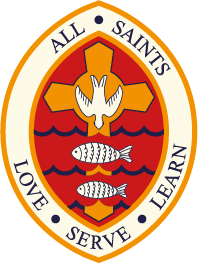Religious Studies
Faculty Leader: Mrs M Sutcliffe
Religious Studies is at the heart of the curriculum and educational experience at All Saints Catholic College and has been designed to:
- Enable students continually to deepen their religious and theological understanding and be able to communicate this effectively;
- Present an authentic vision of the Church’s moral and social teaching so that students can make a critique of the underlying trends in contemporary culture and society;
- Raise students‘ awareness of the faith and traditions of other religious communities in order to respect and understand them;
- Develop the critical faculties of students so that they can relate their Catholic faith to daily life;
- Stimulate students‘ imagination and provoke a desire for personal meaning as revealed in the truth of the Catholic faith;
- Enable students to relate the knowledge gained through Religious Studies to their understanding of other subjects in the curriculum;
- Bring clarity to the relationship between faith and life, and between faith and culture.
Additionally, Religious Studies plays an important part in responding to issues such as terrorism, genocide and domestic issues such as homelessness, all of which are delivered in a way to promote harmony and to highlight human dignity.
Key Stage 3
At Key Stage 3, students will learn and develop skills such as explanation, self-evaluation and scripture referencing. Students will be given many opportunities to reflect on a variety of topics and are encouraged to express their own opinions. The Key Stage 3 Religious Studies curriculum will follow the framework of the new RE curriculum directory ‘To know you more clearly’. The different units of work will allow all students to explore Catholic Christianity and be introduced to a world faith during each academic year.
Students will begin their study of the ‘To know you more clearly’ curriculum in Year 7, covering the following 6 units of work: Creation and Covenant; Prophecy & Promise; Galilee to Jerusalem; Desert to Garden; To the ends of the earth; Dialogue and encounter. These 6 units of work will be subsequently built upon during Year 8 and 9 and, across the three years, students will explore the world religions of Sikhism, Islam and Judaism.
Key Stage 4
All students are entered for the WJEC Eduqas GCSE in Religious Studies (Route B). Students will sit three written exams in total:
- Component 1: Foundational Catholic Theology (1.5 hour written examination – 37.5%)
Origins and Meaning
Good and Evil
- Component 2: Applied Catholic Theology (1.5 hour written examination – 37.5%)
Life and Death
Sin and Forgiveness
- Component 3: Judaism (1 hour written examination – 25%)
Beliefs and Teachings
Practices
What can I do with a Religious Studies qualification?
Religious Studies shows that students have knowledge of certain religious concepts and ideas, and that they show an understanding of why these concepts are important, and have the ability to reflect on important issues in society. It shows they have communication skills, both verbal and written, and an ability to present a point of view whilst also respecting the views of others.
It is possible to continue the study of Religious Studies at A or AS level. At these levels, it is a good accompaniment to many different subjects in the arts, such as English, History and some of the Sciences. It can also be studied in higher education. These qualifications can lead to careers in teaching, journalism, police, social work, law and local government.
